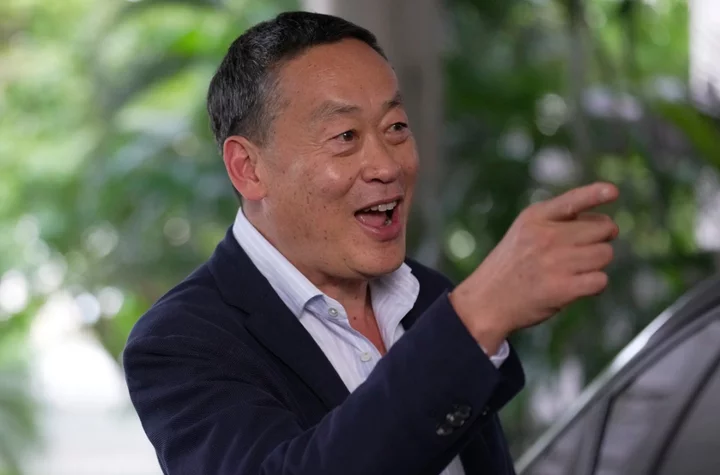
Court clears the way for Thai Parliament to pick a new prime minister 3 months after elections
Thailand’s Constitutional Court cleared the way Wednesday for Parliament to vote for a new prime minister more than three months after national elections by declining to rule on a complaint over the rejection of the winning party's leader. The court had been asked to decide whether Parliament had violated the constitution by refusing to allow the leader of the progressive Move Forward Party to be nominated for a second time as a prime ministerial candidate. Party leader Pita Limjaroenrat had assembled an eight-party coalition with a majority in Parliament's lower house. But under the military-implemented constitution, a new prime minister must receive a majority of votes from both the elected House and the conservative appointed Senate, which was chosen by an earlier military government. Pita lost a first vote in Parliament for prime minister last month, with many senators voting against him because of his party’s call for reform of a law that makes it illegal to defame Thailand’s royal family. Critics say the law, which carries a penalty of up to 15 years in prison, has been abused as a political weapon. Members of the Senate, like the army, see themselves as guardians of traditional conservative royalist values. The combined Parliament then refused to allow Pita to be renominated for a second vote. Several lawmakers from Pita's party and private citizens submitted a complaint to the state ombudsman charging that the action violated the constitution. The ombudsman relayed the complaint to the Constitutional Court, which dismissed the case on Wednesday on the grounds that the complainants had not been directly affected by Parliament’s decision and therefore were not entitled to submit the case before the court. While the court’s decision suggested that Pita himself could file a petition seeking a ruling on the matter, Move Forward spokesperson Rangsiman Rome said Pita would not do so. He said Move Forward continues to strongly believe that Parliament can renominate a prime ministerial candidate, but that the issue should be resolved through parliamentary procedures, not the court. After its two failed attempts, Move Forward stepped aside to allow its biggest partner in the eight-party coalition, the Pheu Thai party, to attempt to form a new government. Pheu Thai, which finished second in the May polls, then excluded Move Forward from the coalition, saying its call to reform the royal defamation law made it impossible to gather enough support from other parties and the Senate to approve a new prime minister. Pheu Thai has since cobbled together a coalition of nine parties with 238 seats in the 500-member lower house, still short of the majority it needs. It plans to nominate real estate tycoon Srettha Thavisin as prime minister. Move Forward said Tuesday that its elected House members will not vote for a candidate from the Pheu Thai-led coalition. It said the coalition, which includes parties from the outgoing military-backed administration, had violated popular demand for political reform "that was clearly expressed through the election results.” The results of May’s general election were a strong repudiation of the country’s conservative elites and reflected the disenchantment in particular of young voters who want to limit the political influence of the military, which has staged more than a dozen coups since Thailand became a constitutional monarchy in 1932. Move Forward's stunning victory came after nearly a decade of military-controlled rule led by Prayuth Chan-ocha, who as army chief ousted a Pheu Thai-led government in a 2014 coup and returned as prime minister after 2019 elections. Many believe that the current Pheu Thai-led coalition needs to include at least one of the two military-backed parties that were soundly rejected in the polls to achieve a House majority. Pheu Thai has not ruled out that possibility. Pheu Thai is the latest in a string of parties affiliated with ex-Prime Minister Thaksin Shinawatra, a billionaire populist who was ousted in a 2006 military coup. Thaksin has said he plans to return to Thailand soon following years of self-imposed exile to escape a prison term in several criminal cases which he has decried as politically motivated. Following the court’s decision, House Speaker Wan Muhamad Noor Matha told reporters on Wednesday that he plans to set the next voting for prime minister on Tuesday and will meet with parliamentary leaders on Thursday to discuss the matter. Read More Ukraine war’s heaviest fight rages in east - follow live Charity boss speaks out over ‘traumatic’ encounter with royal aide Modi says India's economy will be among the top three in the world within five years Grooming cases soar to record high as charity urges tech giants for support Poorer areas missing out because public funding system has broken down – study
2023-08-16 18:50
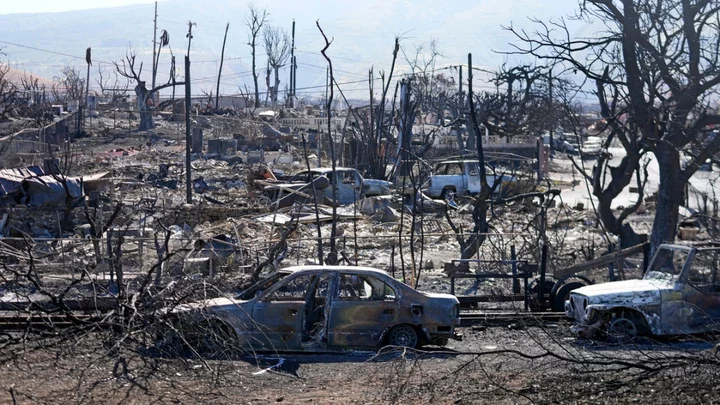
Biden slammed for offering ‘insulting’ $700 payments to Maui wildfire victims
President Joe Biden’s offer of a $700 emergency payment to households impacted by the devastating Maui wildfires has been criticised as an insult to survivors. The death toll from the US’s deadliest wildfires in more than 100 years rose to 106 on Wednesday, with hundreds still unaccounted for, thousands left homeless and an estimated $7bn in economic damage. Mr Biden, who has faced criticism for his handling of the disaster, announced an economic relief package on Monday that included cash payments and temporary housing assistance for survivors. “We're laser-focused on getting aid to survivors, including Critical Needs Assistance: a one-time $700 payment per household offering relief during an unimaginably difficult time. “We have staff on the ground dedicated to helping survivors navigate the registration process,” Mr Biden added. A White House statement confirmed the offer was only available to residents who were displaced from their homes and had critical needs. With 1,200 families sheltering in emergency shelters over the weekend, and 2,200 buildings destroyed, it’s not clear how many Hawaiians will be eligible. It was immediately decried as too small to have a meaningful impact by some commentators. “Make it $700 a month. Per family member in a household. For a minimum of two years,” wrote Scott Santens, the director of the ITSA Foundation which backs universal basic income, on X, formerly known as Twitter. “A one time $700 payment will definitely get their lives, houses and property back! Great job Biden,” another user wrote. Many compared the offer unfavourably to the $113bn in aid the Biden administration has sent to Ukraine since February 2022 to support the war effort, with a further $200m approved on Monday. Financial commentator Mark Wlosinski wrote on X estimated the $700 offer would amount to $1.9m, and labelled it “insulting”. “Can someone please explain how our government can send hundreds of billions to other countries, but chooses to pinch pennies when our own people are in need? An entire town on US soil has been destroyed overnight, and the best our government can do is $700?” Actor Rob Schneider, an outspoken anti-vaxxer and Trump supporter, wrote on X: “The ($115bn) US TAX PAYER DOLLARS TO UKRAINE… $1.9 million dollars to American Maui fire victims. Biden hates Americans…” Right-wing commentator Colin Rugg wrote: “Can someone please explain to me why our leaders are so reckless with money sent to Ukraine but then pinch pennies when the money is spent on Americans?” Mr Biden has faced criticism for his response to the Maui fires from his political opponents. He appeared to brush off a White House pool reporter reporter’s questions when asked for a comment on the rising death toll over the weekend. White House press secretary Karine Jean-Pierre addressed the snub on Monday, saying that Mr Biden remained “deeply concerned” about the wildfires. The newly-indicted former President Donald Trump seized on Mr Biden's apparent no comment, claiming the Democrat “refuses to help or comment on the tragedy”. On 9 August, Mr Biden offered his “deepest condolences to the families of those who lost loved ones in the wildfires in Maui” in a statement as the first fatalities were confirmed. The next day he declared a federal disaster in the state, freeing up federal funds to provide grants for temporary housing and home repairs, and low-cost loans to cover uninsured property losses. Mr Biden made brief remarks during a trip to Salt Lake City last week in his only public comments so far about the unfolding tragedy. “Anyone who's lost a loved one, whose home has been damaged or destroyed, is going to get help immediately,” he said. The White House has since touted its “whole-of-government response effort”, which included deploying 500 federal personnel and thousands of meals, beds and litters of water. The Democratic Hawaii governor Josh Green has publicly praised Mr Biden’s response to the disaster. The Independent has approached the White House for comment. Read More Maui fires – update: Hawaii death toll rises to 106 with 1,000 still missing amid struggle to identify victims Dramatic video shows family narrowly escaping Maui wildfires by fleeing to the ocean How to help victims of Hawaii wildfires ‘I think I messed up’: Moment US representative mistakenly introduces Joe Biden Death toll from devastating Maui fire reaches 106, as county begins releasing names Maui fires death toll rises to 106 amid struggle to identify victims – live
2023-08-16 17:57
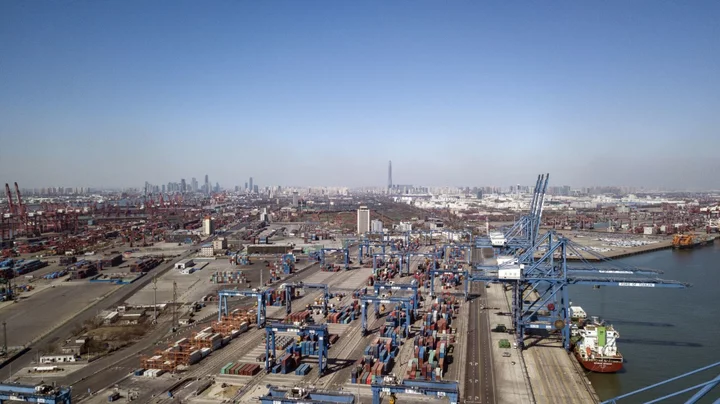
LGFV From ‘High Risk’ Chinese City Draws Blowout Demand for Bond
A local government financing vehicle from one of China’s most indebted cities enjoyed overwhelming demand for a yuan
2023-08-16 17:27
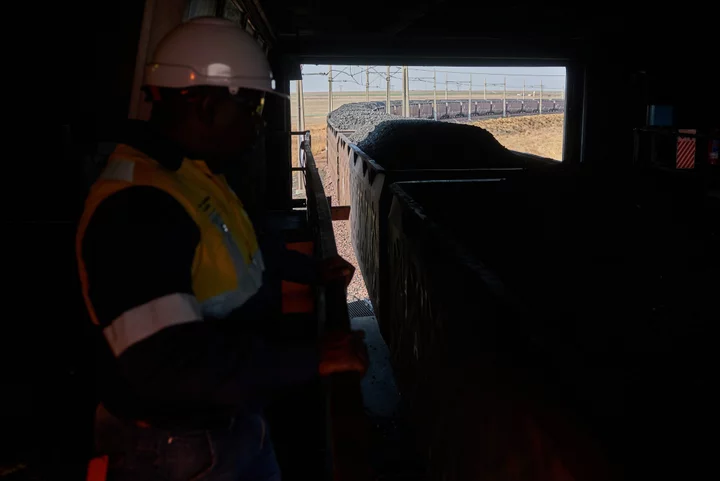
BHP, South32 May Face South Africa Class Action on Lung Disease
BHP Group Ltd., South32 Ltd. and a unit of Seriti Resources Holdings Ltd. may face a class action
2023-08-16 16:46
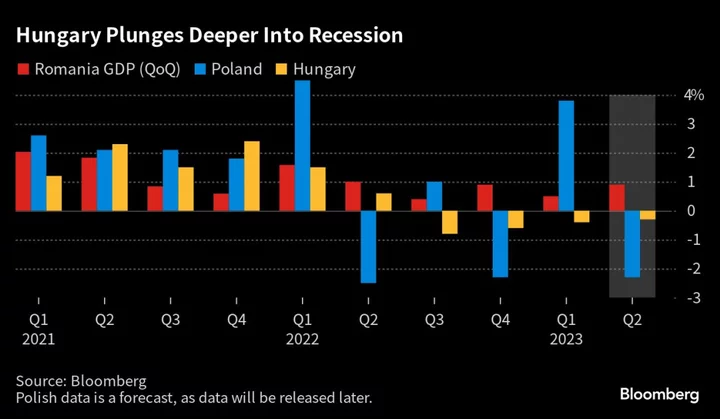
Hungary’s Recession Drags On as East EU Economies Struggle
Hungary unexpectedly plunged deeper into recession for the longest economic contraction in at least 28 years as the
2023-08-16 16:22
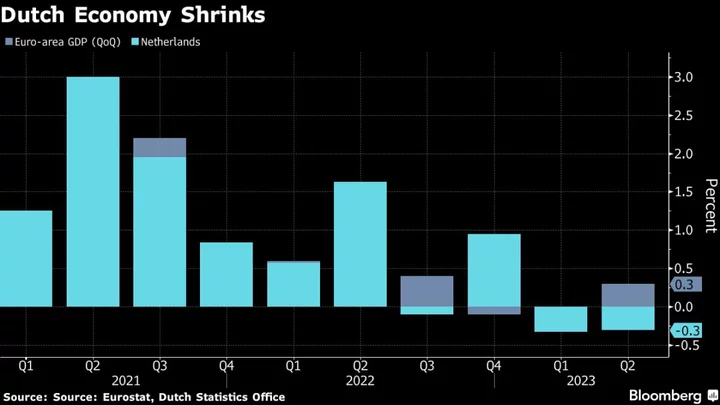
Netherlands Unexpectedly Suffers Recession on Consumers, Trade
The Dutch economy unexpectedly succumbed to its first recession since the pandemic on weakness in both consumer spending
2023-08-16 16:17
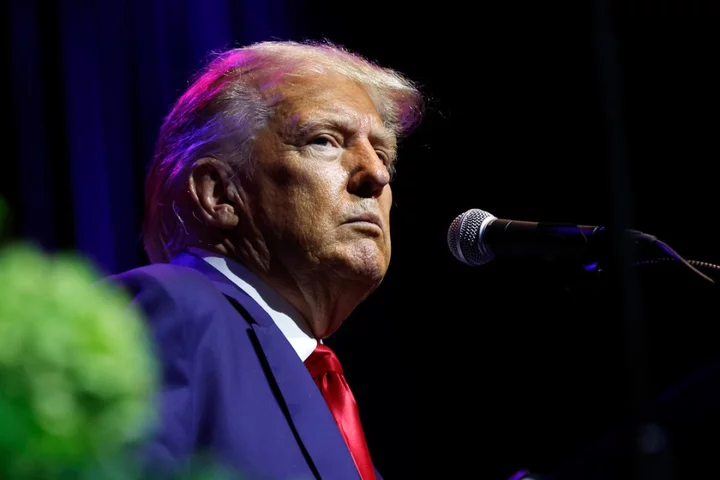
How did a Trump charge sheet get published hours before grand jury vote?
It was the URL heard around the world. On Monday, a document seemingly announcing 13 counts against Donald Trump was briefly published online on a Fulton County web system – before being deleted just as quickly – kicking off rampant speculation about the looming indictment and instantly fuelling claims of foul play from the former president. The initial charge sheet seemed to show an extensive list of criminal charges against Mr Trump stemming from the long-running Georgia investigation into his attempts to overturn the state’s 2020 election results, according to Reuters, which first reported the document. It was published hours before the grand jury eventually voted to indict the former president and a group of his closest allies for running a criminal enterprise to overturn the 2020 election in the state and keep Mr Trump in power. The document, which can still be viewed on the Reuters website, was quickly taken down. Hours later, when the indictment was handed down, it appeared under a different case code. It also included Mr Trump’s 18 co-defendants – something the original document did not. But there were some similarities between the initial posting and the final charge sheet, with both including the exact same 13 charges against the former president. In a statement to The Independent on Tuesday, the Fulton County clerk’s office explained in greater detail what prompted the confusion. It said Ché Alexander, Fulton County Clerk of Superior and Magistrate Courts, used an online document system to conduct a “trial run” of posting a large indictment to test for potential issues. “Unfortunately, the sample working document led to the docketing of what appeared to be an indictment, but which was, in fact, only a fictitious docket sheet,” they explained. “Because the media has access to documents before they are published, and while it may have appeared that something official had occurred because the document bore a case number and filing date, it did not include a signed ‘true’ or ‘no’ bill nor an official stamp with Clerk Alexander’s name, thereby making the document unofficial and a test sample only.” The office, once it was aware of the mixup, said it “immediately removed the document and issued correspondence notifying the media that a fictitious document was in circulation and that no indictment had been returned by the Grand Jury,” the statement added. However, this explanation was only available after the fact. Throughout Monday, little was known about what prompted the initial document to appear then disappear. Officials only said it was “fictitious.” The lack of information was quickly exploited by Mr Trump. In an email to his supporters asking for donations to his campaign, the former president claimed the document was another sign of the “Witch Hunt” against him and asked his supporters for more money. “This is an absolute DISGRACE. These rabid left-wing prosecutors don’t care about uncovering the truth. They don’t care about administering justice or upholding the rule of law,” he wrote to his donors in an email with the subject line “LEAKED CHARGES AGAINST ME.” “The Grand Jury testimony has not even FINISHED – but it’s clear the District Attorney has already decided how this case will end.” Online commentators also began speculating that the document was a hack or maybe a leak; after all, the unthinkable and unexpected already happened once in recent months, with the 2022 leak of a draft opinion of the Supreme Court’s eventual decision overturning Roe v Wade. Republican lawmakers meanwhile flew into a rage. "This is OUTRAGEOUS government conduct and is a very legitimate basis to deem the entire Grand Jury process tainted & corrupted,” Florida Representative Matt Gaetz wrote on social media. “MOTION TO DISMISS!!!" The overarching political narratives – judgment day for Mr Trump, or a political prosecution gone too far – had for a time outrun the verifiable facts on the ground. All the while, the actual grand jury process, the body that eventually recommended Mr Trump’s fourth major criminal indictment of the year, continued throughout Monday, extending into after-hours testimony from Georgia officials. Outside, police continued with a stepped-up security posture including K-9 dogs. Media organisations surrounded the court complex, with lines of tents and cameras that heightened the atmosphere of anticipation. When the indictment was unsealed it emerged that there were 13 felony charges against Mr Trump, including RICO, conspiracy to commit forgery, filing false documents, Solicitation of Violation of Oath by Public Officer and more. In addition, 18 Trump associates have also been indicted, including former White House chief of staff Mark Meadows and former New York City mayor Rudy Giuliani. The document drama was the latest bizarre twist in a high-profile investigation that began shortly after an infamous 2021 phone call, in which Mr Trump was recorded giving explicit requests for top state officials to “find” him enough votes to reverse Joe Biden’s victory in Georgia. Most recently, Mr Trump has falsely claimed Fulton County District Attorney Fani Willis had an affair with a rapper who was the target of a racketeering probe by her office. Read More Trump indictment live: Trump and 18 allies ordered to surrender on RICO charges for Georgia election plot What is Georgia’s RICO law? Why a law created to prosecute the Mafia is being leveled against Trump All the bombshell charges against Trump and his allies in Georgia RICO case How did a Trump charge sheet get published hours before grand jury vote? Truth Social are doxxing grand jurors who indicted Trump in Georgia Trump claims mystery press conference report clears him of Georgia election charges
2023-08-16 15:29
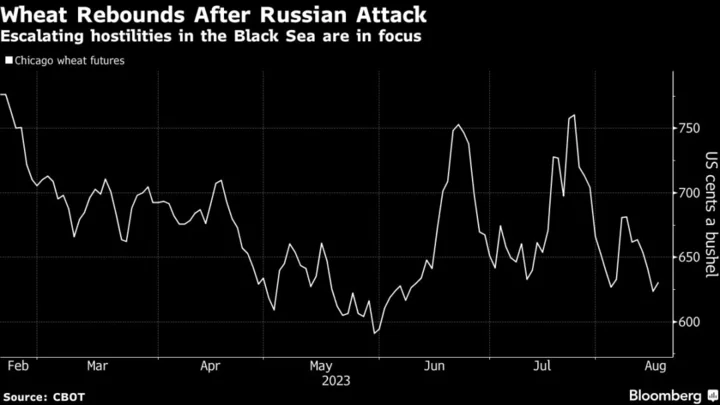
Ukraine Recap: Russian Drone Attack Causes Damage at Danube Port
Russia launched drone attacks in Odesa in southern Ukraine overnight in which warehouses and grain storage facilities at
2023-08-16 15:23
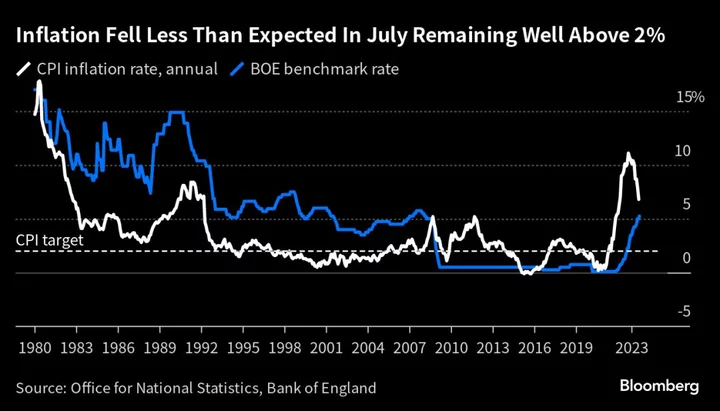
UK Inflation Falls Less Than Expected as Transport Costs Rise
UK inflation remained higher than expected last month, adding to the case for the Bank of England to
2023-08-16 14:59
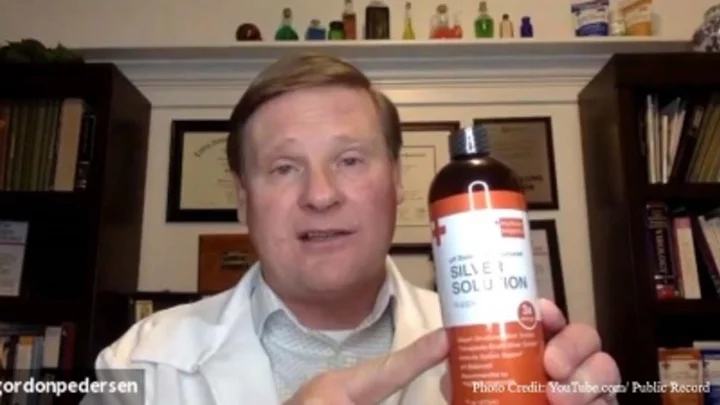
Utah man arrested for posing as doctor and selling fake Covid cure after three years on the run
A man in Utah has been arrested after allegedly posing as a doctor and making at least $2m by selling a fake cure for Covid-19. He evaded arrest for almost three years. Gordon Hunter Pedersen, 63, who lives in Cedar Hills, Utah, was arrested last week on Wednesday after he was charged in 2020 with seven felonies, including mail and wire fraud, selling of misbranded drugs with intent to defraud and mislead, the US attorney’s office in the state said on Monday. He allegedly sold a "structural alkaline silver" online and claimed that the drug "resonates or vibrates at a frequency that destroys the membrane of the (COVID-19) virus, making the virus incapable" of infecting humans, court documents said. He posed to his customers as an "anti-ageing medical doctor" with PhD degrees in immunology and naturopathic medicine, it said. A warrant for Mr Padersen was issued in August 2020 when he failed to appear in a court for the indictment, leading to a three-year manhunt. The arrest in the case comes a month after he was spotted on surveillance camera footage at a gas station around 40 miles south of Salt Lake City. Mr Padersen promoted his fake cure through YouTube videos, Facebook posts, podcasts and websites, wearing a white lab coat with “Dr” monogrammed on it. “There is no drug that man has made that can do the same,” he said in his podcast interview in March 2020. “If you have the silver in you, when the virus arrives, the silver can isolate and eliminate the virus,” he added. He maintained that his silver product can destroy Covid-19 virus in an interview with federal agents but acknowledged that his credentials were exaggerated. He had been promoting a cure for diseases such as arthritis, diabetes and pneumonia, since 2014. But he substantially profited between January and April 2020 when he made approximately $2m in sales from the company he co-owned, My Doctor Suggests, according to court records. The US District Court for Utah filed a restraining order against Mr Pedersen to stop him from selling the products by labelling them cure-alls, the Justice Department said at that time. Following three years of evading authorities, Mr Pedersen was identified by a Food and Drug Administration special agent on 5 July, while he was in a vehicle registered under his wife’s name, Julia Currey, according to prosecutors. The agent tracked the vehicle to a gas station, where Mr Pedersen was captured on a surveillance camera, as stated by prosecutors. His indictment was part of a task force created by attorney general Merric Garland in 2021 to prosecute businesses and entities that tried to “profit unlawfully from the pandemic. His lawyer is yet to comment on the development. Read More Marjorie Taylor Greene addresses online conspiracy theory linking her to Jan 6 pipe bomber Trump claims mystery press conference report clears him of Georgia election charges – live updates Trump shares moody new video with poem voiceover about ‘suffering to win’
2023-08-16 14:58
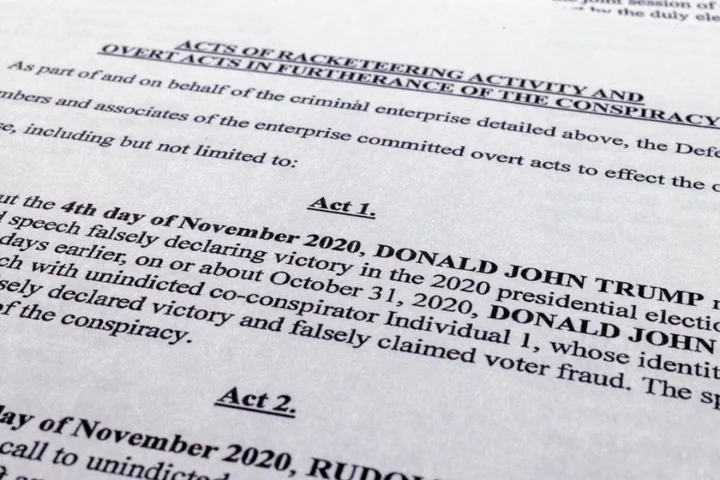
Who are the 30 ‘unindicted co-conspirators’ in Georgia’s massive criminal case against Trump?
A sweeping criminal indictment targeting Donald Trump and 18 co-defendants – including members of his former legal team, White House chief of staff and government officials – also lists 30 unnamed co-conspirators who are accused of supporting the former president’s alleged criminal enterprise to overturn the 2020 presidential election in the state of Georgia. The identities of those unnamed (and, as of now, uncharged) co-conspirators were not immediately clear following a state grand jury’s indictment on 14 August. But many of the details of their alleged actions bear similarities to Trumpworld figures who were identified in previously-reported events described in the indictment. In all, the sweeping charging document outlines a vast criminal conspiracy case connecting the actions of more than 50 people accused of trying to undermine and subvert the outcome of the 2020 election, including attempts to appoint a fraudulent slate of electors loyal to the former president, a harassment campaign targeting election workers, and efforts to copy and distribute sensitive voting machine data from a state elections office. Typically, prosecutors include “unindicted co-conspirators” who are believed to have conspired with the named defendants to commit a crime or multiple crimes, as indicated in the massive RICO case against Mr Trump and his allies. But prosecutors have either provided them some immunity from prosecution in exchange for their testimony or have reached another arrangement. As with the federal indictment targeting Mr Trump’s efforts to subvert the 2020 election, many of the alleged actions outlined in the Georgia case echo those uncovered by the House select committee investigating January 6. Many of the unindicted co-conspirators in the Georgia case are known to the grand jury, the document states. Unindicted co-conspirators nine through 19 are likely the other fake electors who have not been charged in the indictment, while unindicted co-conspirators 24 through 29 are among those likely involved in a scheme to hijack voting machine software in Coffee County. Several people allegedly involved in an effort to seize voting machine software and share files with other election deniers were charged with several crimes in the indictment. One key unindicted co-conspirator – No 20 – allegedly joined a White House meeting on 18 December 2020 involving Mr Trump and attorney Rudy Giuliani and Sidney Powell to discuss “certain strategies and theories intended to influence the outcome” of the 2020 election, “including seizing voting equipment” and appointing Ms Powell “as special counsel with broad authority to investigate allegations of voter fraud in Georgia and elsewhere,” according to the indictment. The first unindicted co-conspirator listed in the indictment is accused of discussing a draft speech with Mr Trump on 31 October 2020, days before Election Day, to falsely declare victory and make baseless allegations of widespread voter fraud and manipulation. The House select committee previously reported that then-President Trump consulted with Tom Fitton of right-wing activist group Judicial Watch on that same day. An email sent to Mr Fitton and obtained by the National Archives includes Mr Trump’s false declarations of voter fraud and a statement claiming that “we had an election today and I won” – a message that January 6 committee member Zoe Lofgren said amounted to instructions for an “intentional” and “premeditated” effort to subvert the democratic process. A second unindicted co-conspirator allegedly received a voice message about voter fraud from Mr Giuliani on 3 November 2020 as well as messages about organizing a fraudulent slate of electors loyal to Mr Trump – including a key meeting on 14 December 2020, when the 16 so-called “alternate” electors convened at the state capitol. The third unindicted co-conspirator referenced in the indictment joined Mr Giuliani and former Trump campaign attorneys Jenna Ellis and Sidney Powell at a now-infamous 90-minute press briefing at the Republican National Committee headquarters bloated with false claims and wild accusations about election fraud and manipulation on 19 November 2020. Ms Powell and Ms Ellis – among members of the so-called “strike force” behind a spurious and failed legal campaign to challenge election results – are now among the 19 co-defendants in the Georgia indictment. The other three people who stood behind the lectern at that press conference were GOP operatives Joseph diGenova, Victoria Toensing and Boris Epshteyn. Robert Sinners – the head of Mr Trump’s Georgia campaign operations whose role in the alleged scheme to subvert the state’s election results – is likely the fourth unnamed and unindicted co-conspirator in the indictment. The indictment outlines several events in the days after Election Day previously uncovered by the House select committee, including correspondence surrounding the fake elector scheme, that match descriptions in the Georgia case. The indictment also notes a White House meeting on 25 November 2020, when Mark Meadows, Trump campaign attorneys and two unindicted co-conspirators met with Pennsylvania state lawmakers to discuss holding a special legislative session to contest election results. Georgia’s current Lt Governor Burt Jones, a former state senator, is likely the eighth unnamed and unindicted co-conspirator in the indictment. The indictment quotes a post from his Twitter account on 7 December, 2020, in which he calls on supporters to “sign the petition” for a special legislative session to review the outcome of the 2020 election, a message shared by Mr Giuliani. That same co-conspirator also was involved with correspondence about the fake elector plot with other co-defendants in the case, according to the indictment. Read More Trump claims mystery press conference report clears him of Georgia election charges: Live updates Mob boss law, 30 mystery co-conspirators and an unmasked plot: Key takeaways Trump’s Georgia indictment Four indictments, 91 criminal charges, up to 700 years in jail: Trump’s legal woes in numbers Meadows, Giuliani, Jenna Ellis and Sidney Powell: The 18 defendants charged with Trump in Georgia RICO case
2023-08-16 14:52
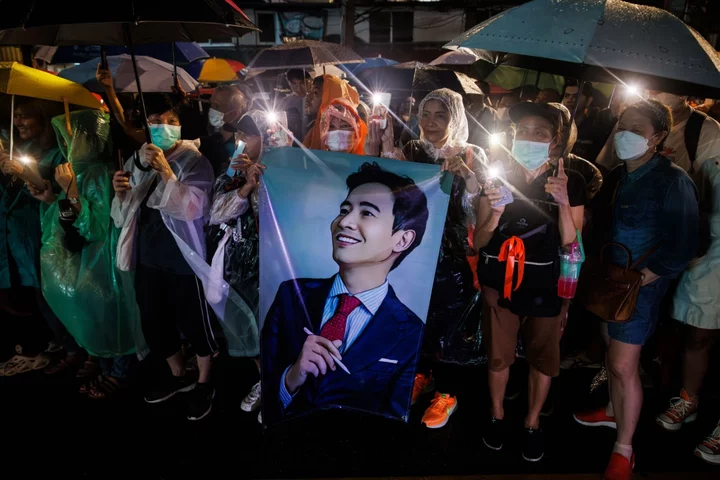
Thai Court Rejects Petition Against Pita’s Renomination Denial
Thailand’s constitutional court rejected a petition challenging a parliament decision last month to deny pro-democracy leader Pita Limjaroenrat
2023-08-16 14:19
